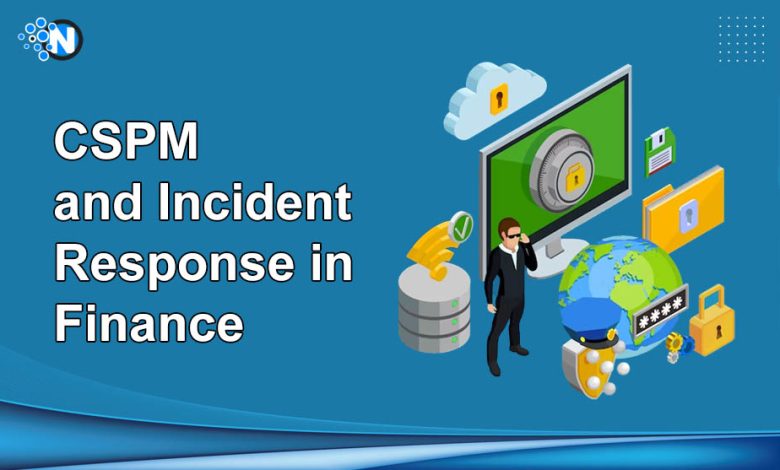CSPM and Incident Response in Finance: A Holistic Approach

Cloud Security Posture Management (CSPM) is the process of continuous monitoring and security configurations in the environment of a cloud. This process involves assessing and making sure that cloud infrastructure aligns with the best security practices and compliance standards.
In the finance sector, where data security and regulatory compliance are essential, CSPM performs a key role. It protects sensitive financial data, prevents data breaches, and ensures compliance with business policies. CSPM affords proactive protection against evolving cyber threats, assisting economic organizations to hold the integrity and confidentiality of their digital assets.
Incident response in finance contains a dependent process to know, handle, and mitigate security incidents. This includes preparing for threats, detecting and analyzing incidents, and executing powerful containment and recuperation strategies. In the finance region, a sturdy incident reaction framework is essential for minimizing the impact of security breaches and ensuring business continuity.
Understanding Cloud Security Posture Management (CSPM)
As a primary step, it is crucial to understand the core components that CSPM is presented with.
Asset discovery and inventory
Asset discovery and inventory are fundamental to CSPM, involving the identification and tracking of all assets within a cloud environment. Significantly, this process ensures a comprehensive understanding of the digital system.

In the finance sector, where data accuracy and protection are paramount, asset discovery and inventory contribute by providing a real-time snapshot of all financial data sources, aiding in regulatory compliance and mitigating security risks.
Configuration management
Configuration management involves maintaining and enforcing security configurations in the cloud’s infrastructure. It ensures that systems operate securely and adhere to industry standards.

In the finance sector, configuration management is crucial for seamless integration with financial systems. By aligning cloud configurations with industry-specific requirements, it safeguards financial data integrity and enables efficient financial operations.
Real-time risk detection
Real-time detection is important in finance to promptly discover and respond to potential security risks. This proactive technique is paramount for preventing financial data breaches and preserving the trust of clients and regulatory customers. Despite its importance, real-time risk detection in the financial sector faces challenging situations along with the growing sophistication of cyber risks.
Continuous monitoring
Continuous monitoring and tracking offer proactive risk identification by means of constantly assessing the security posture of cloud environments.

This allows early detection and mitigation of vulnerabilities before they can be exploited. In the finance sector, the proactive risk identification that is supplied by continuous monitoring is beneficial. It enables financial organizations to deal beforehand with rising threats and defensive financial data and ensures compliance with regulatory frameworks.
Incident response in finance
Preparation: Preparation is crucial in the financial industry to proactively deal with potential security incidents. Establishing strong incident response strategies and conducting regular simulations ensure a swift and powerful response when encountering cyber threats. In finance, where the stakes are excessive, the significance of preparation lies in minimizing the impact of security incidents, defensive sentiment financial data, and preserving the trust of clients and stakeholders.
Detection and analysis: Timely detection is a cornerstone of incident response in finance. Rapid identification and analysis of security incidents enable organizations to understand the nature and scope of the threat, facilitating prompt and informed decision-making. The role of timely detection in finance cannot be overstated. It allows for the implementation of effective countermeasures, preventing further escalation of the incident and safeguarding financial systems.
Containment, eradication, and recovery: Strategies for containment, eradication, and recovery are tailored to the unique challenges of the finance sector. Swift containment limits the impact of incidents, eradication ensures the removal of threats, and efficient recovery processes are critical for minimizing downtime. In finance, these strategies are designed to protect financial assets, maintain operational continuity, and comply with regulatory requirements. Incident response in the financial industry aims at not only resolving incidents but also learning from them to enhance future security measures.
A holistic approach to cloud security in finance
A holistic approach to cloud security is imperative for comprehensive protection in the finance sector. This involves seamlessly integrating Cloud Security Posture Management (CSPM) with incident response to proactively address and mitigate security threats.
Integration of CSPM and incident response
Collaboration for proactive security: Emphasizing collaboration between Cloud Security Posture Management (CSPM) and Incident Response fosters proactive security in the finance sector. By sharing insights and intelligence, these two components create a unified front against evolving cyber threats. This collaboration enables preemptive measures to address vulnerabilities, ensuring a robust defense posture.
Coordinated incident handling: A seamless transition from detection to response is pivotal for effective incident handling in the financial sector. The integration of CSPM’s guidance in incident response streamlines the approach. Further, it enables a coordinated and quick response to security incidents. This synergy makes sure that identified risks are addressed promptly and effectively, minimizing the potential impact on monetary operations and data integrity.
Compliance in finance: Maintaining regulatory needs is the necessity of the holistic approach to cloud security in the financial sector. The integrated efforts of CSPM make contributions to ensure compliance with business-specific policies. By constantly monitoring and aligning security postures with regulatory conditions, financial organizations can showcase a dedication to data safety, thereby fostering trust among customers and regulatory bodies.
In essence, the holistic approach involves not only fortifying defenses against potential risks but also creating a unified and strategic response mechanism. This approach enhances security and aligns financial organizations with the stringent compliance standards prevalent in the finance sector. This approach can be easily implemented with the help of modern security posture solutions like CheckRed. Here’s how CheckRed helps:
Continuous monitoring and risk detection
CheckRed’s CSPM is a cutting-edge solution designed to provide comprehensive continuous monitoring of cloud security postures. It offers real-time visibility into cloud environments, allowing organizations in the finance sector to stay ahead of potential threats.
The real-time risk detection capability of CheckRed’s CSPM is particularly significant in the finance industry. By continuously monitoring configurations and activities, it promptly identifies and alerts organizations to potential risks, enabling swift response and mitigation.
Continuous compliance assessments
CheckRed goes beyond traditional CSPM by offering ongoing compliance assessments. It actively scans cloud environments for adherence to industry regulations and internal policies, helping ensure that financial institutions maintain cloud security compliance in a dynamic regulatory landscape.
Generation of remediation workflows
CheckRed streamlines the response process with helpful remediation workflows. Upon detecting risks or compliance gaps, CheckRed not only alerts but also provides detailed steps for remediation, ensuring a quick and efficient response to security incidents.
Conclusion
In the end, the synergy between modern-day CSPM security solutions and incident response forms is a strong shield against cyber threats within the finance sector. They provide a proactive and reactive approach to protection, addressing vulnerabilities and mitigating risks promptly. This holistic approach to cloud security in finance is essential for staying ahead of evolving threats and ensuring the integrity of financial structures. CheckRed’s CSPM performs a key role in this holistic approach, implementing continuous tracking, ensuring compliance, and facilitating efficient incident response, ultimately contributing to a resilient and stable financial sector.




